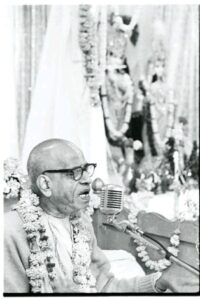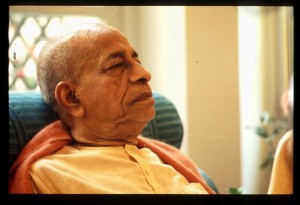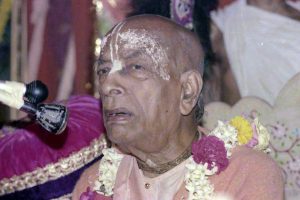June 24 1976 Vrndavana lecture
…. So gṛheṣu saktasya. Generally, people become too much attached to family life. I sometimes say that in the Western countries the young boys, they come to Kṛṣṇa consciousness, their only one great asset is they are not family-wise attached. That is very good qualification. Someway or other, they have become. Therefore their attachment to Kṛṣṇa becoming staunch.In India they have got organized family attachment. They are not interested. They are after money now. That I have experienced. Yes.
So family attachment is the greatest impediment in the matter of advancing in Kṛṣṇa consciousness, but if the whole family is Kṛṣṇa conscious, that is very nice. Just like Bhaktivinoda Ṭhākura. He was a family man, but all of the, Bhaktivinoda Ṭhākura, his wife, his children—and the best children is our Guru Mahārāja, best child… So he has sung by his experience, ye dina gṛhe bhajana dekhi gṛhete goloka bhaya. If family-wise, everyone is engaged in Kṛṣṇa’s service, that is very nice. That is not ordinary family. That attachment is not ordinary attachment. But generally people are attached materially. That is condemned here. Śeṣaṁ gṛheṣu saktasya pramattasya apayāti hi. They are called pramatta. Everyone is thinking that “My family, my wife, my children, my nation, my community, that is everything. What is Kṛṣṇa?” This is the greatest illusion imposed by māyā. But nobody will able to give you protection.
dehāpatya-kalatrādiṣv
ātma-sainyeṣv asatsv api
teṣāṁ pramatto nidhanaṁ
paśyann api na paśyati
[SB 2.1.4]
Everything will be finished. Nobody can give us any protection except Kṛṣṇa. If we want to be freed from the clutches of māyā-janma-mṛtyu-jarā-vyādhi [Bg. 13.9]—we must take shelter of the lotus feet of Kṛṣṇa through the spiritual master and live with devotees who have engaged themselves for the same purpose. It is called… What is that exact word? Sakhi or something. Now I am forgetting. But in the same category we must live and execute our Kṛṣṇa consciousness. Then these impediments, gṛheṣu saktasya pramattasya. Anyone who is…, all the karmīs, they are attached to this family life, but family life is good provided there is Kṛṣṇa consciousness. Gṛhe vā vanete thāke, hā gaurāṅga bole dāke. It doesn’t matter, either he is in family life or he’s in sannyāsī life, if he’s a devotee, then his life is successful. Thank you very much. (end)
May 8 1975 Perth, Australia
Prabhupāda: Yes. That you can do. You American people, you can do. That I am instructing. You can do. And actually, because some of you will cooperate the movement is going on. Therefore I came to America. When I found that in India no intelligent boys were coming, then I decided, “Let me go to America.”
Paramahaṁsa: Still, even after you went to America and brought back so many European and American disciples, still the Indians are so slow to come and join.
Prabhupāda: Because they have been… The disease is very chronic. They are not opulent. That diagnosis already given. They have become poverty-stricken. So daridra-doṣa guṇa naśe.Although they are born in India, they have got many qualification, due to this poverty-stricken position, they… Their first business is how to… Because they have got family attachment, so they cannot sacrifice. They will work very, very hard. You have seen how they are going to office, how…, because they have got the responsibility of family. That is Indians another feature. They take family responsibility. In your country there is no such thing. There is no family. There is no family responsibility. In India still that old tradition is going on. Therefore they cannot sacrifice the family responsibility, although they are willing. And the whole thing is it is due to poverty-stricken position. They have got family responsibilities. They think, “If I go, then whole family will starve. How can I go?” That is the exact position. And to come to that stage, that “Let my family starve, I don’t mind,” that is very higher stage. That is sarva-dharmān parityajya mām ekaṁ śaraṇaṁ vraja [Bg. 18.66], “Oh, no responsibility, simply I have got respons…” That is not ordinary stage. You cannot expect these things from ordinary man.
Some Conclusions-From the above two lectures Srila Prabhupada explains family attachment, which, as we know, comes first from bodily attachment. He says that in western countries the devotees who came and joined him, their only one great asset is they have no family attachment.
Whereas in India we had a completely different situation. Even though the majority of Indians are born with some sense of Krsna Consciousness, due to their poverty stricken condition, they cannot give up family responsibility, and therefore remain in family or extended bodily consciousness which means they work mainly for family maintenance.
And we see this as Prabhupada calls it- a “chronic disease” which remains even up to the present. Those with no so called family members around them are more easily attracted to following Krsna Consciousness principles and have the time to pursue them. Even though everyone starts every day with the same 24 hours, the persons who are more serious, find more time to devote themselves to filling their day with Krsna centered activities. That seriousness comes from slackening the attachment to matter, namely our bodies, and the bodies of our so called family members, who may or may not want to pursue self realization activities as much as we do.
The entire process of purification is based upon hearing and chanting the Holy Names as a regular daily function. If somebody does this, then the result is practically realized knowledge of Krsna and detachment from this world of matter. And this eventually leads one back to Godhead.
Hare Krsna
damaghosa das
SB 2.9.34-TRANSLATION–O Brahmā, whatever appears to be of any value, if it is without relation to Me, has no reality. Know it as My illusory energy, that reflection which appears to be in darkness.
Srila Prabhupada asks—What do you understand by the word-Maya ?
June 13 1974 Paris
Prabhupāda: What do you understand by the word “māyā”?
Yogeśvara: That which is not.
Puṣṭa-kṛṣṇa: Things which we place value on that have no relation to Kṛṣṇa.
Prabhupāda: The māyā is explained very nicely in the Bhāgavata, yathābhāso yathā tamaḥ. Just like sun is reflected in the water, and the light is reflected again on the wall. This is the exact explanation of māyā. Reality, this material world, the man who manufactured all these things, nobody knows where he has gone, but these things are taken as reality. This will be also finished. It will remain as relics, as Rome, relics, but when it was…, the houses were prepared with great enthusiasm as reality. And now it is as relics.So the energy expended for manufacturing those house, that is also māyā, and now they are being visited as relics. That is also māyā. So all these things are māyāra vaibhava, expansion of māyā. So if somebody says that you don’t appreciate these things? No, we appreciate, very much appreciate intelligence. But if you, for this appreciation, if you forget, then it is māyā. Forget Kṛṣṇa.
Puṣṭa-kṛṣṇa: Kṛṣṇa.
Prabhupāda: Then it is māyā. Otherwise, it is reality. If they would have installed Deity worship in these buildings, how much nice it would have been. People chanting, dancing, and taking prasādam, twenty-four hours. Then it is no more māyā. It is reality. Such big, big, nice houses, they should have been places of worshiping Kṛṣṇa. But they’re worshiping bones, keeping some dead bones, and…
below is the verse Srila Prabhupada was referring to above….
SB TEXT 2.9.34
ṛte ‘rthaṁ yat pratīyeta
na pratīyeta cātmani
tad vidyād ātmano māyāṁ
yathābhāso yathā tamaḥ
TRANSLATION–O Brahmā, whatever appears to be of any value, if it is without relation to Me, has no reality. Know it as My illusory energy, that reflection which appears to be in darkness.



